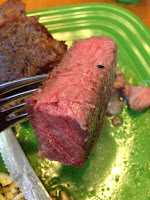I've fought a long-lasting battle against over-cooked meats, eggs, and burgers...until now. Alas, I have found just a weapon to win my battle.
Behold! My ANOVA Precision Cooker...a temperature-controller-water-circulating thingie that I can fit into most pots in my house. Wondering what those little white ball things are in the picture? No, I'm not cooking giant fish roe. Be patient young Padiwan...I'll get to that later.
Hey, I don't have anything against shoe leather for all of you
"well-done" folks. It's just that I'd just rather have shoe leather on
my feet and not in my tummy. My oldest brother, Dean, is a "well-done"
man. Or should I say "If it ain't burnt...it's too raw" kind of guy.
Ugh!
I have always been fascinated with the cooking technique used in many a professional kitchen, called "sous vide." Sous...what, you ask? Sous vide, which simply means "under vacuum" in French. No, I'm not cooking in a pressure cooker or in my vacuum (ew), but I am vacuum sealing (or putting in zip-top bags) food into pouches and submerging them into a temperature controlled water bath for a certain amount of time. The results are amazing. It is truly a blend of science and food.
Here is a perfectly cooked (for 1 1/2 hours) medium-rare (at a constant 136° F) rib-eye steak. I seasoned the raw steak(s) with lots of fresh ground salt (our million year-old pink stuff) and black pepper and sealed them up using my trusty FoodSaver. Which I finally replaced with a newer model. Can you believe the one I had was the first model and I had gotten that in 1999?!
Anyhoo, back to topic. You can season your steak however you like. Olive oil, marinade it (use the FoodSaver for that, it's fantastic!), or anything your taste buds desire. You then set the ANOVA to the temperature you need (started out with hot tap water), slip the steak(s) in and forget it for the next hour and a half. You can leave it in the water for up to three hours! No grill to tend to. You can actually do other things while you cook perfect (and expensive) cuts of beef. After it's done, I cut open the pouch and removed the goods. Then I finish it off (this is a must) by giving it a good sear on all sides of the steak with a butane torch. Gotta love fire!

Do you notice how this steak is medium-rare all the way through? None of that over-done meat with a medium-rare center that you achieve from conventional cooking methods. Regardless of the thickness, all of the meat will be cooked at that perfect temperature.
 Here is a perfectly cooked egg. Yeah, I'm one of those that likes their eggs super-soft and creamy. Just like velvet! It took me awhile to figure this one out, and after cooking and eating five or so eggs, I got it right! Good thing I love eggs. This egg was cooked in its shell at 167° F for 14 1/2 minutes. I usually gobble these up as soon as they are done cooking, but logic would tell me that I could hold eggs at this temperature for some time. So you could cook a dozen and have them all be perfect for an Eggs Benedict horde. I'll have to try it out.
Here is a perfectly cooked egg. Yeah, I'm one of those that likes their eggs super-soft and creamy. Just like velvet! It took me awhile to figure this one out, and after cooking and eating five or so eggs, I got it right! Good thing I love eggs. This egg was cooked in its shell at 167° F for 14 1/2 minutes. I usually gobble these up as soon as they are done cooking, but logic would tell me that I could hold eggs at this temperature for some time. So you could cook a dozen and have them all be perfect for an Eggs Benedict horde. I'll have to try it out.  And here is a perfectly cooked hamburger patty. This photo is not the best, but your burgers don't shrivel up to hockey pucks and you get a succulent, juicy, perfectly medium cooked burger. We serve our burgers on homemade Brioche hamburger buns. I'll post that recipe at a later date. After you have these, you'll never buy store-made again! Oh, and that's my special melty Velveeta-like cheese (made from just a few ingredients) on the burger. I'll save that post for a later date too.
And here is a perfectly cooked hamburger patty. This photo is not the best, but your burgers don't shrivel up to hockey pucks and you get a succulent, juicy, perfectly medium cooked burger. We serve our burgers on homemade Brioche hamburger buns. I'll post that recipe at a later date. After you have these, you'll never buy store-made again! Oh, and that's my special melty Velveeta-like cheese (made from just a few ingredients) on the burger. I'll save that post for a later date too.
I've cooked chicken breasts using sous vide and I must admit that I will be hard pressed to eat white meat any other way. I've also cooked chicken thighs using my ANOVA, and they were tasty as well. I have not experimented with fresh veggies yet, since I've been on a meat kick.
Oh, those little round things in my pot? Those are polypropylene balls used to "blanket" the surface of your water as you heat up and cook with. These simple little orbs help you maintain your heat, therefore saving on electricity. They also reduce water evaporation, therefore keeping you from having to replenish the water during those hours and hours of cooking. Hours and hours you say?
Yes, you can cook a cheap, tough-ass cut of meat until it falls apart and it could take hours and hours, but I'll leave that for another time.
































